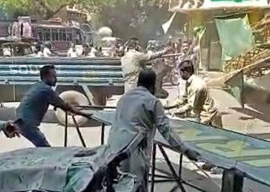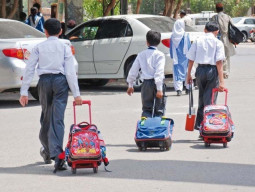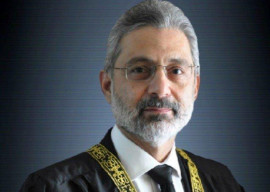
Each of the three protagonists in the conflict is guilty of falsifying narratives, though not in the same measure. The standard Pakistani narrative holds that proportionate military force had become necessary and was used to subjugate the rebellion of a few bandits and that no war crimes were committed by its soldiers. For Bengalis, the war was a just revolt against years of political, economic and military subjugation by the western half and it ended with ‘three million’ atrocities committed by Pakistani forces — the liberation fighters apparently did not harm anyone. India, for its part, has always claimed that its intervention in Bangladesh was purely charitable, conducted only to rescue oppressed Bengalis from Pakistani brutality.
The Pakistani narrative was, and still remains, the most unsettling. If a country breaks into two, it is but natural to expect a rational state’s power brokers to engage in greater introspection and self-reflection so it can avoid another dark chapter in its life. However, this has not happened.
Civilian and military governments in Pakistan did not prosecute those responsible for war crimes or even sanction anyone legally for allowing the civil war to occur; granted that a few high-ranking soldiers lost their jobs, but no one was meaningfully held accountable judicially or in parliament. The nation thus never learnt why the use of brute force by its hitherto invincible army had failed so miserably to pacify the people of East Pakistan.
Indeed, General Yahya Khan’s arrogant speeches during and after the war provide a chilling insight into the general disdain felt by many in the Pakistani military and the political elite towards a policy of humility. Even the shameful surrender of 90,000 soldiers in what was to be the largest post-World War II prisoners of war surrender was not enough to prompt sincere regret. If these mythical delusions were confined to memoirs or petty conversation, one would not find this too objectionable. However, many of these false narratives have been fed wholesale to millions. It is still common to find well-educated Pakistanis who have internalised the propaganda that there was no causal link between West Pakistani subjugation and the onset of civil war, that the Pakistan Army committed no war crimes and that defeat was primarily a result of a foreign conspiracy.
India’s claims of being the benevolent neighbour intervening for humanity’s sake also, of course, need to be checked. It cleverly saw an opportunity to dismember its adversary into two and it was clearly troubled by the millions of refugees turning up at its door — so it acted mainly out of self-interest, not romantic and altruistic ideals of Bengali welfare. In fact, it never really helped Bangladesh stand on its feet after independence and the two countries have generally had hostile relations ever since.
As for Bangladeshi narratives, there is relatively less fabrication here. It is true that the West Pakistani establishment had subjugated the people of that country for years; refused to enlist Bengalis in important positions in the military, did not share political and economic power with them equitably, marginalised their linguistic heritage and, of course, finally robbed them of a democratic victory that was rightfully theirs in 1971.
Nevertheless, a caveat is necessary: the three million war crime victims’ figure that the Bengali government promotes is not generally considered true — even if the number is, say, 100,000, it is still a mass atrocity worthy of attention and so the Bengali propagandists should not do injury to their narrative by corrupting their relatively ‘clean’ story.
Further, as Bangladesh begins the process of trying war criminals, why doesn’t it acknowledge the many war crimes committed against Biharis and others by its Mukti Bahini liberation fighters, aided by India? The events of 1971 are in the past but false narratives still remain. Perhaps it is now time for the South Asian neighbours to do a service to their people and inject some honesty into their respective histories and finally ditch the big lies of 1971.
Published in The Express Tribune, December 16th, 2011.
COMMENTS (60)
Comments are moderated and generally will be posted if they are on-topic and not abusive.
For more information, please see our Comments FAQ










































we read the article. it said a lot. did we learn anything from it? in order to get freedom for the people of West Pakistan we will have to make far more sacrifices and over a longer period. The people have been subjugated through terrorism ,surrogate lashkars and the bogey of the Americans. Please relent and allow the Pakistanis their freedom. People are fighting in Baluchistan,P.K.,and in some cases Sindh and Northern areas.Many sacrifices have been made starting from Allama Zaheer and culminating in the killing of Benazir Bhutto. Even Peoples Party seems to have been taken over by the cuties of the establishment. Please restore the freedom of the Pakistani people.
Here is an interesting book on the Hidden History of East Pakistan, titled "My People, Uprooted"...You can read the entire book online, free at: http://bengalvoice.blogspot.com/
Why bother?
Bengalis are very dissimilar in almost every respect from the Pakistanis.
Their level of competence was and is much inferior. Union of states should be between equal people.
Even today most of their factories are run by Indian and Pakistani experts.
indians are brainwashed beyond the threshold of insanity
@Yash: U r crazy, india has 30 states, more than 35 different boards for education and numerous languages. Have u read all of those?
@Straight_Talk: "Now we have become different in so many ways. May be after another 50 years we will become so different in thinking and orientation that we will almost become like strangers. " Wouldn't that be nice!!!! I would like that estrangement to continue to progress until world is able to make a clear distinction between us rather than merely on the basis of the passports we carry. For, we are certainly two very different people.
India will always take advantage of any situation that can harm Pakistan. This is why its important for Pakistan to get rid of India's influence in Afghanistan, even if it means siding with Taliban. India will take advantage of the situation in Balochistan, if not today then certainly 2 or 3 years down the road.
Well analysised, yes the history of south Asia is full of basis but the fact is that the greater contribution is from Pakistan. bcz it's the fact that in pak in CSS paper the person who attempt to write the truth will surely be failed in history paper. It is written in PAKISTANI books that pak army had performed very well in 71 war even though the fact is that 90,000 soldiers were surrendered with arms in that war. History always says the truth no one can change the course of history. And beware history never forgive anyone without any discrimination.
@Muyyu. The same question was asked to a holy man.He replied that the goal of human life is love of God.And that is only possible when you know what He looks like and what are His pastimes.The description of God is given in the Vedic Literature,'venum kwanantam aravinda dalaya taksham,baraha vatamsam asit ambudha sundarangam,kandarpakotikamaniya vishesha shobham,Govindam adi purusham tam aham bhajami'(Brahma Samhita),that is, I worship Govinda (Krsna),the primeval Lord who is adept on playing on His flute,whose eyes are like blooming lotus petals,whose head is bedecked with peacock feathers,whose figure of beauty is tinged with the hue of rain bearing clouds and whose unique loveliness charms millions of cupids. Regarding His pastimes an encyclopedic information is given in the Vedic literature,eg,Srimad Bhagvatam. A seeker of truth whould do well to rise above religious prejudices and attain the Supreme goal.
Ok, ok indian friends not your textbooks, how many of you will repeat the same thing but the over all belief among the nation spread by Mass media or government lead political newspapers, whatever... even everyone here is so critical about Pakistani Textbooks... I can aslo recall that there wre only 4 to 5 lines about 1971 war... A total enjoyable commen made by an indian reader was that india just went their on the appeal of Mujib ur rehman to HELP... (like the US led NATO forces help ).... :))
Sometimes when I see such kind of responses of 'good india' and "bad Pakistan" I wonder we Pakistanis, in the spirit of nationalisim and partiotisim should keep on resisting and not accepting the truth... see how blind people can be... we have a right wing meida to, but by the grace of god almighty even that is very critical about government policies and everything... so, this is not only Indian media which is hostile and venemous against Pakistan, but they represent the mindset of a common indian....
Kar lo idher dosti ki baatein :p
Besides a pseudo-trial designed to hang the members of the Jamaat-e-Islami, there is nothing of substance in whats happening in the "independent" tribunal. And all this only to weaken Sheikh Hasina's opposition.
Well interesting article but rather interesting comments....... These all indicate the Indians have been more strongly and convincingly brain washed and for them they were the only the good guys. Pakis at least have the courage to admit the wrong doing made on their end. Whole world including the Indians know that the Indian interest was far more than just avoiding the refugees. Mukti Bahni was not organised and trained by the local mafia or civil defense. There were definitely highly organised and well financed camps (which we now know as terrorist camps) along the western border of now Bangladesh. They all were definitely not to control the influx of refugees but had far more aims and objectives most which were achieved due to the usual short shortsightedness of Pakistani ruling elite.....
I am from Tamilnadu, India. I did study about indo-pak war in my text book in 1998. But it was not more than 10 lines, very short. Our state's History books does not concentrate on post-independence and wars.
Lot of Pakistani comments here mention about Indian text books. As far as I am concerned i have never read about any India-Pakistan war in History text books. Though i must say that i studied history till 10th std. So can't say if history as an elective subject in 10+2 and above has all this in the text books. However in general me and all my friends got to know about India-Pakistan wars from newspapers and elders.
@Author
I do not, repeat do not condone violence in any from, much as a means of revenge. But since you want the truth to be told I will draw your attention to just one of many brutal attempt to silence the voice of freedom in East Pakistan. One midnight in that fateful December'71 (can't remember the date though) Professors,students,noted intellectuals were herded into the famous Jagannath Hall in Dhaka University and mowed down like some cattle. And as for the Biharis, many of them were active collaborator of this hated oppression by the Pakistani authorities and they were seen by the freedomfighters.In those tumultuous days some sort of reprisal were bound to happen (though I repeat it was wrong). I mention this only to bring the perspective on anti Bihari sentiment prevailing those days. That's all.
@You Said It: Well, if you say so. Be happy in your cloud.
@Faiza Khan: Yes, good that we get all party's historians checking what happened. I'm totally confused by 3milion dead (unbelievable number in such a short timeframe !. This is ½ the World war II cusualties over 5years !?!) or 100,000 or 300,000. No matter what it was a tragidy of dimensions, but personally I think it was good that the two nations was created, sorry to say, because there are differences in language, logistics and West did stupidly treat their fellow countrymen with content and discrimination. I just visited the link of the book by Ms. Bose, and it is excellent. I'll surely buy it and read it. I also like Bengalis justifiably to have a rightful stand against the leaders of West, but out NOT from totally wrong figures. That alienate WEst pakistanis, and make the healing process difficult. I do hope that Biharis does get the full support of Pakistan and will be airlifted home once Pak is back on its feed financially. Hoping for a forever Bangla-Pak relation. We are one people, after all.
Thanks Mr.Dawood for presenting the TRUTH, but its not the complete truth, as lot of things never get presented or discussed.
The target of the Genocide were intellectuals - Teachers/Professor/Lawyers/Doctors, so basically thinking community, so once if Pakistan succeded in quelling it there would be no raise for freedom again from East Pakistan. It was systematic and brutal. (Had India not intervened Bangladesh would have become a slave state) Hindus were specifically targeted, even though they were in a minority, the Armed forces of West Pakistan focused their brutality on entire hindu population in Bangladesh and Muslim intellectuals. The West had close it eyes, no other country had the time nor the resource to fight for the Bangladeshi. Tikka Khan and Pol Pot no difference, both killed their own people.There are many families in Calcutta whose roots prior to 1971 were in East Pakistan and really have sorry tales to tell about how their Grand Parents had to suffer.
Bottomline is Pakistan could not unify people in the name of Islam. The breaking away of Bangladesh brings to life what Maulana Azad had predicted about Pakistan even before it was formed. Pakistan is still doing the same mistakes. It is not ready to accept that a nation cannot be made only out of a common belief in Islam.
India and Pakistan started off from the same position as far as nation building is concerned post independence. But India concentrated on building on its internal strengths. Pakistan started with an external orientation of fighting for the liberation of Kashmir. Now after more than sixty years and having fought 4 wars among themselves, Pakistan is fighting hard to save itself from being looked upon as a client state of USA while India is attracting the attention of the world as a potential growth driver and innovator for the world economy in the future.
Our forefathers who went through the trauma of partition we very similar to each other in every respect. Now we have become different in so many ways. May be after another 50 years we will become so different in thinking and orientation that we will almost become like strangers.
@indian response.: Well ur an indian wat else can we expect. Your coming up with what you have been taught in your text book. Read the article without bias.
A very good article, a very good analysis from all 3 players of the game. Captain of the game was Mr. Bhutto who benifitted most from these atrocities, killings and hatred. Kindly analyse it more as world has observed that he was a good friend of Indira Gandhi and family of Nehru which relationship continues till date.
@Meekal Ahmed "The role of India should not be romanticised. They saw an opportunity to render Pakistan asunder and they took it." Who better then you, a renowned economist, to recognise that India intervened when it realised that it was far more cheaper to fight a war then to host millions of Bengali refugees, fleeing West Pakistan army atrocities.
Absolutely correct, the number of soldiers was 45000 which included about15000 paramilitary and police, rest were civilians such as public servants. The figure has been confirmed by two most important persons Maj Gen Rao Farman Ali and Gen Niazi@Meekal Ahmed:
this is funny to see that how some people cannot see that author have mentioned and admitted all the mistakes made by Pak Army... Indian readers who are not ready to accept the opportunist Indian Government during the 1971 war should see before criticising Pakistan and the writer that how open the writer and even the comments are ... and they have a heart to write truth no matter if it goes against thier country... and the Pakistanis who take pride in saying anything about thier country should learn something from them.
I would like to clarify one assumption in this narrative. Author assumes that the 1971 war is taught in Indian school textbook. This is wrong at least for the textbooks in the state of Bihar (Where I did my schooling). Any post independence war was not part of our history curriculum till 10th standard (Till when History is a mandatory subject). So at least in state of Bihar most of the students (Other than those who study history in their higher education) are not taught anything about 1971 war or for that matter any of the wars after 1947.
@Zillur Rahman: Sir, the World has been able to produce only one Mahatma Gandhi in centuries and he was unfortunately murdered in 1948. Their is no chance of producing another such individual, even with cloning.
A laughable effort to spread more lies. Now after 40 years, it is really pathetic attempt to come out of guilt feeling. It is more ironic if you see the pretext on which Paksitan helped america create taliban to destroy Afghanistan while claiming to be helping them.
Truth and Reconciliation Commission is the only solution, good article.
The experimentation of dividing a land based on religion, blood or any ethnicity has failed. Humans just needs their basic rights. Humans have not learned and followed the basic teachings of love for all..... They kept on discriminating each other with race, color, language and so-called nationalism and politicians/elites took the benefit of this weakness from thousands of years and it may continue....for next thousands of years. Because humans are designed to be exploited by one way or another....till the end. They can never be united on any basis......
@indian response.: The world always sides with the victors and not the losers irrespective of who was right or who was wrong.
After the 1947 partition, M.K.Gandhi took it upon himself to force the Indian government to transfer to Pakistan the latter's share of assets.
40 years have gone by after the 1971 partition. Pakistan is yet to agree to an equitable share of the assets of united Pakistan. It has not offered reparations to Bangladesh and it has not tried a single military officer for war crimes. In fact Pakistan is yet to offer even an apology to Bangladesh.
This is a great attempt at seeking parity with India and Bangladesh for the crimes we committed and the out right racism we practiced since independence. By exposing India's "benevolence" and Bangladesh's "double standards" we seek to hide what would be crimes in most societies. Ours clearly is not one of them.
We are repeating our mistakes of 1971 in FATA and Balochistan. FATA should be made a province and Pashto be recognized as an official language for Pathans. The federal government is taking Pathan identity away by imposing Urdu on them. Sure teach them Urdu but let them have their identity which is embedded in Pashto. Similarly, in Balochistan federal government hasnt done any development while extracting resources and denying Baloch their identity. This is extremely unfair. We need to wake up, share power with provinces, and give the provincial government more control rather than making federal government a Mughal ruler for all and using army for conflict resolution.
Those who do not remember their past are condemned to repeat their mistakes. Plain and simple.
Dawood, I wholeheartedly agree with you. First, East Pakistan won the election fair and square, West Pakistan should have sat in the opposition. Second, why should West Pakistan impose Urdu on Bengalis? They have their language and a beautiful culture. East Pakistan's identity should have been preserved by Bengali ideals. Third, Netaji Bose's daughter actually published a very fair and balanced article on 1971 war and its a good read:
http://themuslim.ca/2010/11/27/the-courageous-pakistan-army-stand-on-the-eastern-front-an-untold-story-of-1971-indo-pak-war/
A very well witten and balanced piece.We in Pakistan do not believe in critical self-analysis and are great in pushing trash under the mat.I still remember how surrender of East Pakistan was announced by Radio Pakistan,The news item went like this ''With the mutual agreement of Pakistani and Indian military commanders Indian army was allowed to enter Dhaka today ''This was followed by the most shameful speech by President Yahya declaring that the war has not ended;it will continue in fields in streets and on roads,so on and so forth.But do not forget it was the one and one only Bhutto who suppressed the Hammood ur Rehman report
*India, for its part, has always claimed that its intervention in Bangladesh was purely charitable, conducted only to rescue oppressed Bengalis from Pakistani brutali.
No, it was millions of refugees crossed into India's border. India need not change any text books. Do not bracket India with Pakistan. We do not have text books written to suit the army or the government. In fact, there is no single body producing or authorizing text books.
@Author: Even yo have not learned anything from history and are still spewing the standard lines!!! The rape and pillage of Bengali populace started in March (operation searchlight) ... this was conducted and backed by the Pakistan army. This pumped in upwards of 10 million refugees in India. this mayhem continued for 8 months lasting into December when the skirmishes and war with India began. What do you think India was going to do? Sit idly by while this influx was going to cause instability inside it's own borders? I think India showed patience, tried to get the world to look at what was going on inside East Pakistan - the genocide was on a daily basis those days! India lost scores of soldiers, went into a economic recession for 4 years and made Pakistan even madder than before - India has nothing to gain from the East Pakistan debacle. even today it suffers from illegal Bangladeshis coming in , settling down and destabilizing the societies in the eastern states.
The author is partially correct in reporting India's (read "Prime Minister Mrs.Gandh's) position on the 1971 war. My memory of the daily news item just before the onset of war was that pakistani army has to stop the atrocities in Bangladesh because the flood of refugees fleeing to India to avoid the massacre was straining the already meager food resources of India. Real or propaganda, we all understood and agreed that this is a valid position for India to take. I don't remember the 'benevolency' argument as the primary one. It probably was there - but the primary and most compelling argument was economics. India and Indians didn't believe that pakistan would ever compensate the cost of taking care of the millions of refugees, if it did achieve victory in quelling the rebellion.
India did not instigate the civil war but did take full advantage of the opportunity.
The article is incorrect.
Indian history books do state that it intervened primarily because of the ~10 million Bengali refugees who streamed into India fleeing the genocide. This is recognized as the most important factor, since the stress of the refugees would have destabilized the social fabric of West Bengal and northeastern India -- a region already reeling from poverty and just recovering from the cycle of famines and cyclones to which it was prone until the 1960s.
Indian text books also state that the lawfully elected Awami League's appeal to intervene and stop the genocide provided the justification, and the strategic advantage against Pakistan with its propensity to start wars was a secondary benefit.
The article is not only thoughtful and provocative but also makes a persuasive argument for our shortcomings as a nation. We are a nation whose birth was based upon lies and so is our history full of manufactured lies. I do not think we ever made an effort to tell the truth or for that matter even if we even know what the truth is. We do not believe in an honest self-introspection instead much prefer to practice rather zealously lying and denying. So sir, what you are asking of us can never be delivered because truth will pose a serious threat to our very existence.
With three million dead in a few months, the Pakistan Army's brutal 50,000 strong machine must have been way efficient than the German juggernaut numbering a few million that exterminated over 6 million in 6 years... yes atrocities were committed by the Pakistanis but not the three million figure that is commonly thrown out there.
An inspiring read! Atrocities and war crimes whether a 100,000 or a million or even just one need to be punished
excellent read and the ending was good.. it was the Biharis who have always suffered and still are...:(
WOW!! Loved it... reading it gave me a sigh of relief... thank God we have someone educated, Modern and young to think Neutrally and write such unbiased account...
http://www.bbc.co.uk/news/world-south-asia-13417170
This book is from an Indian Author Dr. Sharmilla Bose who heads a department in Oxford Univeristy and is a research scholar there... after proving with thorough Research and enough evidences she reiterates that Both Bangladesh and India have demonised Pakistan Army... as the only villan party in the war to be on the wrong side of history.and which actually is another big lie... though this is important to note she does not exenorate Pakistan Army from commiting War crimes but they don;t hold sole responsibilty of the atrocities and genocide. mostly the brutal slaughtering of Biharis by Nationalist Bengalis is a proved historical fact, however, as it have been a hard thing to digest for Pakistan Armed forces to admit their own mistakes, same is the case with Bangladesh and India, these facts are as much as hard to digest for them as for anyone else
Good and profound.
But one correction: there were not 90,000 army people. They included civilians including some harmless people like my uncle in the office of the survey general of Pakistan.
The role of India should not be romanticised. They saw an opportunity to render Pakistan asunder and they took it.
"India, for its part, has always claimed that its intervention in Bangladesh was purely charitable, conducted only to rescue oppressed Bengalis from Pakistani brutality... In fact, it never really helped Bangladesh stand on its feet after independence and the two countries have generally had hostile relations ever since."
First you say India helped B'desh only to rescue oppressed Bengalis from Pakistani brutality and then later you say India never really helped B'desh stand on its feet (which, I'm assuming, means after B'desh got independence). Now why should India help B'desh when once the brutality from Pakistan ends? India is under no obligation to help other countries; it was purely for one reason that India intervened - that millions of Bangladeshi refugees were pouring into India. No secret hidden agenda behind this. It's known to one and all.
Well written and thought provoking article.. But i will add something about the present situation. Everyday hundred of people are killed brutally by army and Drones but no one ask about them, and US killed 24 soldiers and they uproar. We have no polices both internally and externally so that we may spent a good and peaceful times in world. People doesn't know the reality that why we lost Pakistan. Dawood as for research is concerned it is difficult for Researcher to reach the primary sources
the writer only mentions Gen. Yahya Khan's arrogant speeches, but makes no mention about ZA Bhutto's boasting that Pakistan has been saved when the military launched its campaign?
the writer only mentions Yahya Khan's arrogant speeches, but about ZA Bhutto's boasting that Pakistan has been saved when the military launched its campaign?
Sir, Did India demand anything in return from Bangladesh for liberating it ? Did it seek to occupy it or gain any territory ? Those facts themselves should expose all the lies taught against India. Today, India and Bangladesh have excellent relations. India has given 1 billion $ in loans to Bangladesh and has been generous in settling severel border and water issues with it. The only time India had cold relations with Bangladesh is when BNP , which represents the religious right in Bangladesh, comes to power.
To say that India and Bangladesh are hostile after 1971 is totally untrue. India helped Bangladesh economically and did not interfere politically and most important of all promptly removed its army from the area. India Bangladesh had a few minor incidents which cant be termed as all out hostility. Therefore ur basis of India's self interest only narrative falls completely flat. It was a part self interest, part refugee problem and part a humanitarian effort. Unlike Pakistan occupied Kashmir, where Pakistan runs the govt, Bangladesh is an independent country and does not have Indian army interference. So please don't try sowing seeds of hatred between Bangladesh and India. The only country with wrong narratives between all these three countries is Pakistan. If u r attempting to lessen Pakistan's wrong b pointing fingers at the other two, it is not working. The world pretty much is in synch with the narratives of the other two. Not urs.